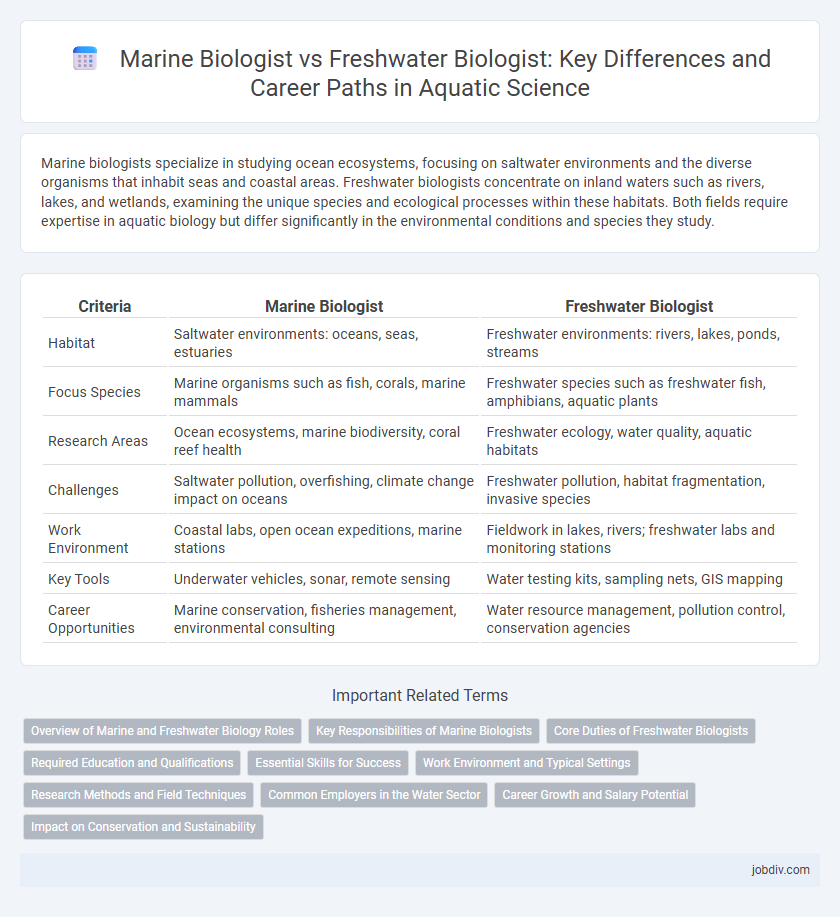Marine biologists specialize in studying ocean ecosystems, focusing on saltwater environments and the diverse organisms that inhabit seas and coastal areas. Freshwater biologists concentrate on inland waters such as rivers, lakes, and wetlands, examining the unique species and ecological processes within these habitats. Both fields require expertise in aquatic biology but differ significantly in the environmental conditions and species they study.
Table of Comparison
| Criteria | Marine Biologist | Freshwater Biologist |
|---|---|---|
| Habitat | Saltwater environments: oceans, seas, estuaries | Freshwater environments: rivers, lakes, ponds, streams |
| Focus Species | Marine organisms such as fish, corals, marine mammals | Freshwater species such as freshwater fish, amphibians, aquatic plants |
| Research Areas | Ocean ecosystems, marine biodiversity, coral reef health | Freshwater ecology, water quality, aquatic habitats |
| Challenges | Saltwater pollution, overfishing, climate change impact on oceans | Freshwater pollution, habitat fragmentation, invasive species |
| Work Environment | Coastal labs, open ocean expeditions, marine stations | Fieldwork in lakes, rivers; freshwater labs and monitoring stations |
| Key Tools | Underwater vehicles, sonar, remote sensing | Water testing kits, sampling nets, GIS mapping |
| Career Opportunities | Marine conservation, fisheries management, environmental consulting | Water resource management, pollution control, conservation agencies |
Overview of Marine and Freshwater Biology Roles
Marine biologists study ocean ecosystems, focusing on saltwater organisms such as coral reefs, marine mammals, and plankton, analyzing their interactions and environmental impact. Freshwater biologists specialize in inland water bodies like rivers, lakes, and wetlands, examining freshwater species and water quality to support ecosystem health and biodiversity. Both roles require expertise in aquatic biology, but they apply their knowledge to distinct habitats and conservation challenges.
Key Responsibilities of Marine Biologists
Marine biologists primarily study ocean ecosystems, focusing on the behavior, physiology, and interactions of marine organisms such as fish, mammals, and coral reefs. They conduct research on marine habitats, monitor environmental changes, and assess human impacts like pollution and climate change on ocean biodiversity. Their work often involves fieldwork on ships, laboratory experiments, and data analysis to support marine conservation and sustainable resource management.
Core Duties of Freshwater Biologists
Freshwater biologists specialize in studying the ecosystems of rivers, lakes, and wetlands, analyzing water quality, aquatic organisms, and habitat conditions. Their core duties include assessing the health of freshwater habitats, monitoring species diversity, and investigating the impacts of pollution and climate change on freshwater systems. These scientists play a crucial role in conservation efforts and the management of sustainable freshwater resources.
Required Education and Qualifications
Marine biologists typically require a bachelor's degree in marine biology, oceanography, or related fields, with advanced roles often necessitating a master's or Ph.D. specializing in marine ecosystems. Freshwater biologists usually hold degrees in biology, ecology, or environmental science, emphasizing freshwater habitats, with professional certifications enhancing expertise in lake and river system studies. Both professions demand strong skills in scientific research, data analysis, and fieldwork to monitor aquatic life and environmental conditions effectively.
Essential Skills for Success
Marine biologists require strong expertise in oceanography, marine ecosystems, and skills in scuba diving for underwater research, while freshwater biologists focus on limnology, freshwater habitats, and water quality analysis techniques. Both domains demand proficiency in data collection, species identification, and ecological assessment using modern tools like GIS and remote sensing. Critical thinking, adaptability to field conditions, and effective communication of scientific findings are essential skills for success in both marine and freshwater biology careers.
Work Environment and Typical Settings
Marine biologists primarily conduct research in oceanic environments such as coral reefs, coastal regions, and open seas, often working on boats or at marine research stations. Freshwater biologists focus on inland aquatic systems including rivers, lakes, ponds, and wetlands, frequently collaborating with environmental agencies or universities in field stations. Both professions involve extensive fieldwork, but their typical settings differ based on the biodiversity and ecological challenges unique to saltwater versus freshwater ecosystems.
Research Methods and Field Techniques
Marine biologists employ underwater diving, remote-operated vehicles (ROVs), and large-scale oceanographic surveys to study saltwater ecosystems, while freshwater biologists utilize wading, electrofishing, and net sampling in rivers, lakes, and wetlands. Marine research methods often include satellite tracking and deep-sea submersibles to monitor migratory patterns and biodiversity, contrasting with freshwater biologists' focus on water quality testing and habitat restoration techniques. Both disciplines rely on molecular analysis and ecological modeling, but their field techniques differ significantly due to the unique characteristics of marine versus freshwater environments.
Common Employers in the Water Sector
Marine biologists frequently find employment with government agencies such as the National Oceanic and Atmospheric Administration (NOAA) and environmental nonprofits focused on ocean conservation, while freshwater biologists often work for organizations like the Environmental Protection Agency (EPA) and state wildlife departments overseeing lakes and rivers. Both specialties are sought after by academic institutions and research centers dedicated to aquatic ecosystem studies. Water utilities and consulting firms specializing in water quality assessments also commonly hire freshwater and marine biologists for environmental monitoring and resource management.
Career Growth and Salary Potential
Marine biologists typically study ocean ecosystems and organisms, offering career growth opportunities in research institutions, environmental consulting, and governmental agencies focused on marine conservation. Freshwater biologists specialize in lakes, rivers, and wetlands, with career prospects in water resource management, pollution control, and habitat restoration projects. Salary potential varies by location and experience, but marine biologists often command higher wages due to the specialized nature of oceanic research and the demand for expertise in marine biodiversity and climate impact studies.
Impact on Conservation and Sustainability
Marine biologists and freshwater biologists play crucial roles in conservation and sustainability by studying aquatic ecosystems and their unique biodiversity. Marine biologists focus on oceanic habitats, addressing challenges like coral reef degradation and overfishing, contributing to marine protected areas and sustainable fisheries management. Freshwater biologists concentrate on rivers, lakes, and wetlands, tackling pollution, habitat fragmentation, and invasive species to ensure freshwater resource preservation and ecosystem resilience.
Marine Biologist vs Freshwater Biologist Infographic

 jobdiv.com
jobdiv.com